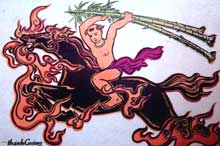 The Department of Cultural Heritage under the Ministry of Culture, Sports and Tourism made the said-above announcement on January 26.
The Department of Cultural Heritage under the Ministry of Culture, Sports and Tourism made the said-above announcement on January 26.
The result of the second assessment round will be informed in June
and the result of the final round will be announced at a meeting of the
Intergovernmental Committee for the Safeguarding of the Intangible
Cultural Heritages in Kenya in November.
The Giong Festival is held from the 6th day to the 12th day of the 4th lunar month every year at Phu Dong (or Giong) Village in Gia Lam District, Hanoi,
as well as in some other regions of the capital including Phu Ninh
Village in Soc Son District and Xuan Dinh Village of Tu Liem District.
The main festival day is on the 9th day of the 4th lunar month.
The festival is original, because it commemorates a legendary character that ancient Vietnamese turned into an immortal saint.
The festival celebrates Saint Giong, a legendary Vietnamese hero who fought against the northern invaders.
The legend says that once upon a time, a poor woman from Giong
Village went to the rice paddy and saw a giant step. Curious, she
stepped onto the step; not long after, she discovered she was pregnant
and then gave birth to a son she named Giong. As a three-year old, the
boy still didn’t know how to speak and never laughed. But when the
country was invaded, the boy suddenly began to speak and asked the King
to give him an iron horse, an iron suit of armour and an iron rod, so
that he could fight against the invaders. He then rose up to become a
giant.
After having fought triumphantly the enemy, he and his horse went to
Soc Mountain. On the mountain top, he removed his armour and flew into
the sky with his horse. This festival is considered one more testament
to the indomitable spirit of the Vietnamese nation when pitted against foreign invaders.
Festival performances recount Saint Giong’s celebrated battles as his
troops squared off against the aggressors, symbolised by crowds of
people from four communes in Phu Dong Village.
The festival also involves young boys and girls acting out the
performance’s most important parts, after having practiced for the
festival all year.